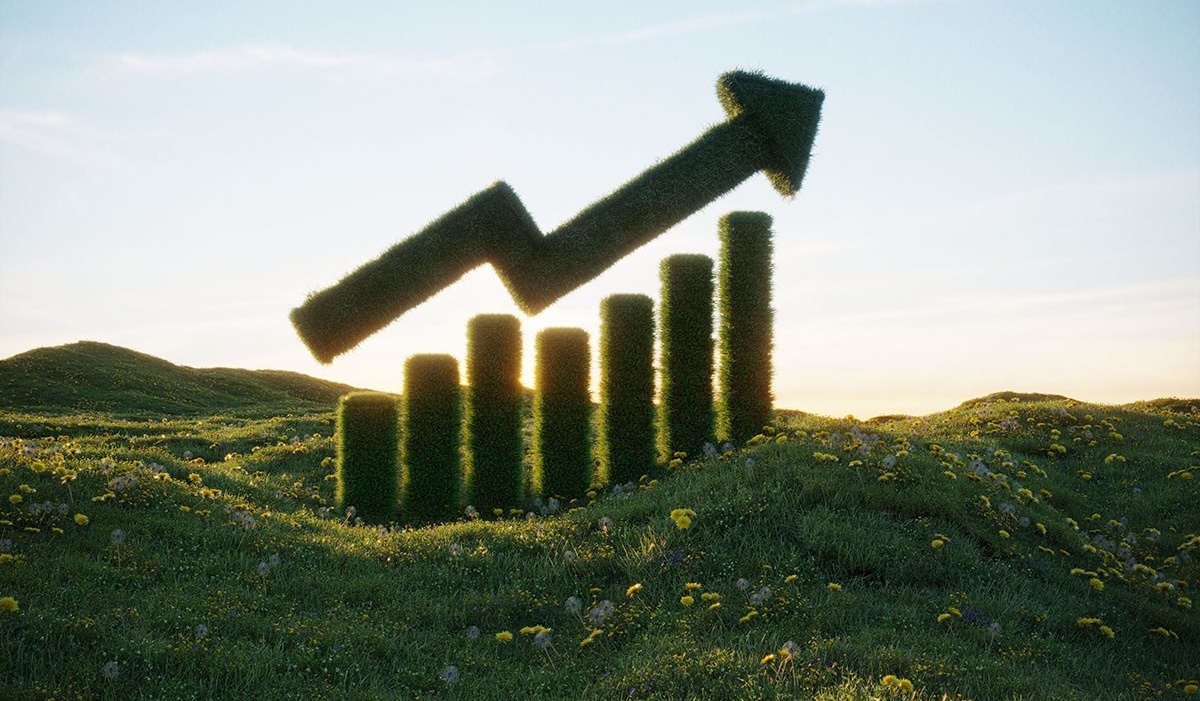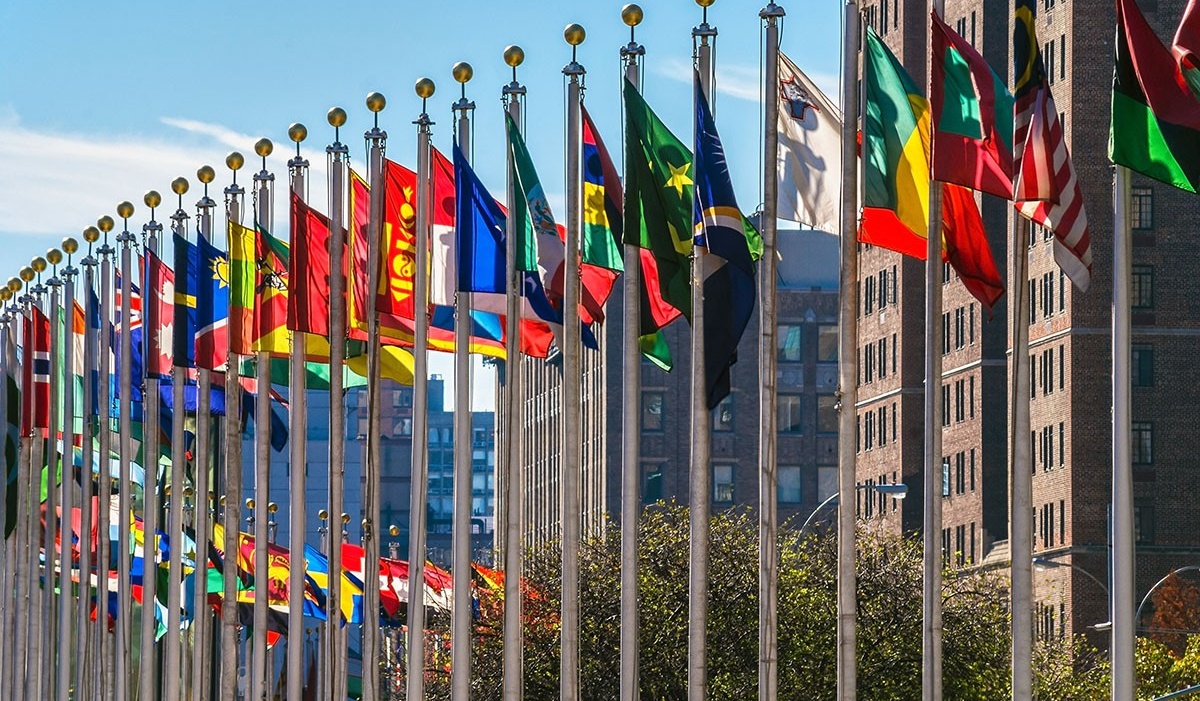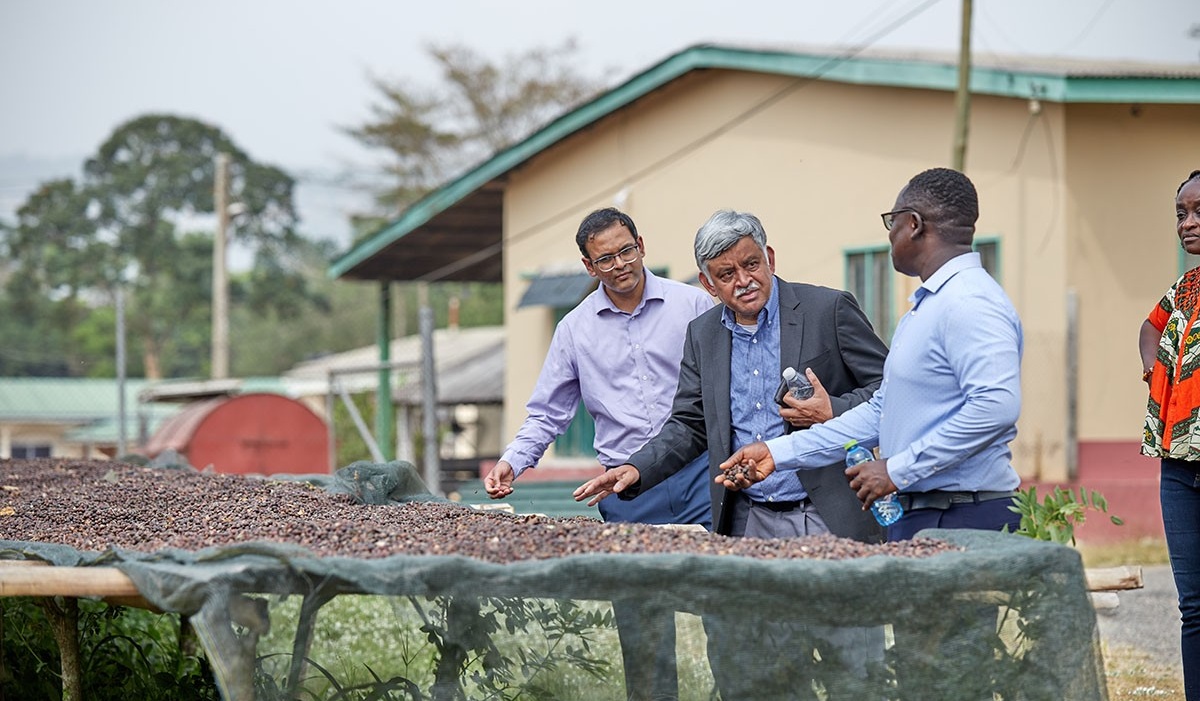The Business of Climate Change
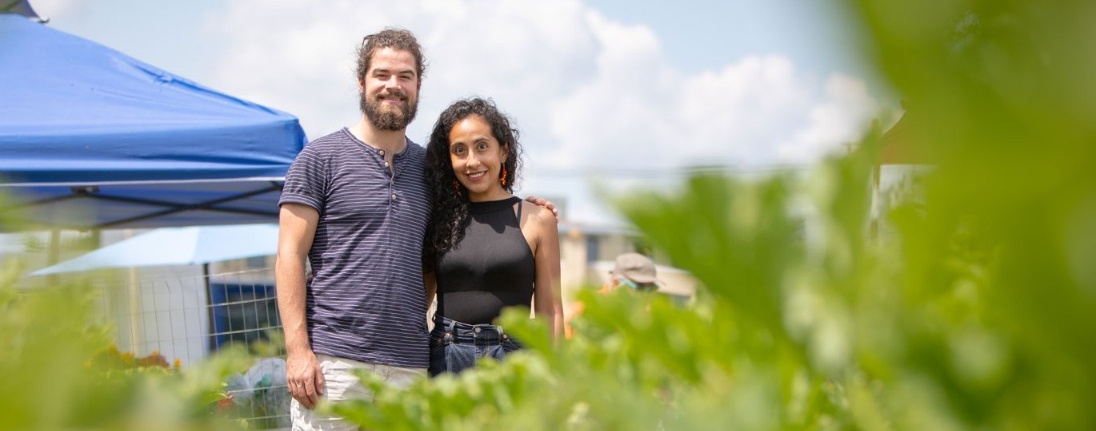
Sustainability is good for the planet — and good for the bottom line.
As New York's flagship and one of the nation’s leading public research universities, the University at Buffalo is deeply committed to addressing regional and global environmental challenges through innovative research, education and outreach programs.
Here in the School of Management, we're doing our part by working together to make change that positively impacts our community and planet. In class, our students learn why sustainability makes smart business sense, and use their skills to help local nonprofits. Meanwhile, our faculty study climate change through the lens of business — from responsible investing to the market for recycled plastic, and beyond.
Research
School of Management faculty question theories and bring new perspectives to pressing challenges — including sustainability and climate change.
Examples
Kyle Hunt, assistant professor of management science and systems, is part of the launch of a new Department of Homeland Security Science and Technology Directorate initiative that will address critical security issues in the Arctic.
Through the ADAC-ARCTIC Center of Excellence, a consortium of academic, industry, government, laboratory and local and indigenous community partners will provide access to rigorous research and education resources for DHS, and broader homeland security stakeholders.
“With the changing ecosystem in the Arctic increasing risk to operational missions and the narrowest distance between mainland Alaska and mainland Russia only about 55 miles, this initiative will leverage the expertise within the nation’s colleges and universities to help meet homeland security needs in the complex and evolving Arctic domain,” says Hunt.
From electric vehicles for transportation, to solar panels and windmills for energy generation, and hydrogen and geothermal for heating, energy transitions are impacting virtually every industry and customer.
In this webinar, Ananth Iyer, dean and professor, focuses on the impact of these transitions on the supply chain and the regulations, targets and metrics that impact the demand shifts associated with these products. Using insights from a 10-year project on critical material supply chains with the Department of Energy, as well as reports regarding automobile supply chains and product environmental claims, Iyer demonstrates that if done right, these transitions can provide a great opportunity for localized production and economic growth, while also benefiting customers.
School of Management research analyzed the performance of nearly 4,000 hedge funds and found that those that focused on green (environmentally friendly) stocks outperformed ones that invested more heavily in brown (less environmentally friendly) stocks by a difference of about 8% — making it a smart strategy for both investors and hedge fund managers.
“Our findings highlight a growing trend where the alignment of environmental sustainability with financial objectives attracts both commendable returns and public support,” says Cristian Tiu, chair and associate professor of finance.
Aditya Vedantam, assistant professor of operations management and strategy, shares supply chain strategies and an actionable agenda for sustainability, profitability and social responsibility.
In addition, Vedantam has delivered seminars to a variety of organizations, including the local chapter of the Institute of Supply Management and the UB Alumni Association.
Real-World Experiences
School of Management students can choose from a robust array of experiential learning opportunities — locally and around the globe — to see firsthand how organizations successfully incorporate sustainability into their mission and operations.
Examples
Through a School of Management initiative, UB has received formal association with the United Nations, and will help advance the 2030 Agenda for Sustainable Development and the 17 Sustainable Development Goals.
“With the approval, we are joining a large family of organizations that support the UN Charter and the Universal Declaration of Human Rights, and are committed to advancing the 2030 Agenda for Sustainable Development and the 17 Sustainable Development Goals,” says Dorothy Siaw-Asamoah, clinical professor of organization and human resources, director of the Center for Leadership and Global Impact. “This is a tremendous opportunity to build the reputation of UB and the School of Management while making an impact on initiatives that align with UB’s position as SUNY’s flagship and support its ambition to become a top-25 public research institution.”
Siaw-Asamoah headed-up the university’s efforts to achieve the UN association. In her role as faculty director of global programs, she led School of Management Undergraduate Honors students to the inaugural Green Summit at the UN Conference Centre in Bangkok, Thailand and hosted a visit by UN Communications Officer Felipe Queipo, among many other initiatives.
The School of Management has built its relationship in Ghana and across Africa for years with continually expanding programs that benefit students, faculty and partners from both countries. A recent trip included an academic research component: analyzing the cocoa industry supply chain from farm to store shelves.
“The impact of climate change on cocoa beans is real,” says Aditya Vedantam, associate professor of operations management and strategy. “The yield got hit by about 40% this year and if you don’t have a crop to sell, as a farmer you get no revenue — which will impact nearly 3 million people just in Ghana. This issue is likely to arise in other industries, so it’s our job to work with local leaders and experts to help answer the question, ‘What can we do?’”
This collaborative, visionary thinking helps to further connect UB and the School of Management to the global community and to those taking on challenges like the ones set by the United Nations Sustainable Development Goals.
The UB Sustainable Business Association strives to educate members of the UB community on the importance and viability of sustainability in the business world, which aims to create value through decisions that holistically consider people, planet and profit.
The club communicates the strategies business leaders are implementing today to mitigate the pressing issues of climate change, pollution, social injustice and many more, all while upholding a triple bottom line. The triple bottom line is a framework that allows companies to be profitable, while remaining conscious of their environmental and social impacts.
Students can choose to complement what they learn on campus and gain meaningful international business experience through a wide range of global programs.
Past trips have taken students to Milan, where in the Sustainability, Innovation, Entrepreneurship and Leadership in Europe course, they broadened their marketing knowledge through two projects at PRAXI, a consulting firm in Milan, Italy: double materiality and community management.
The First-Year Global Experience initiative focuses on helping students develop intercultural communication skills while enhancing their ability to live and lead in a global society. The program combines an academic course with an embedded 10-day international study abroad experience, and each academic course is tied to the UN’s Sustainable Development Goals for 2030. Students also have visited Costa Rica and the United Kingdom.
Academic Programs and Teaching
Through their coursework, students look at sustainability from multiple perspectives and gain a deeper understanding of its impact on business strategy and operations.
Examples
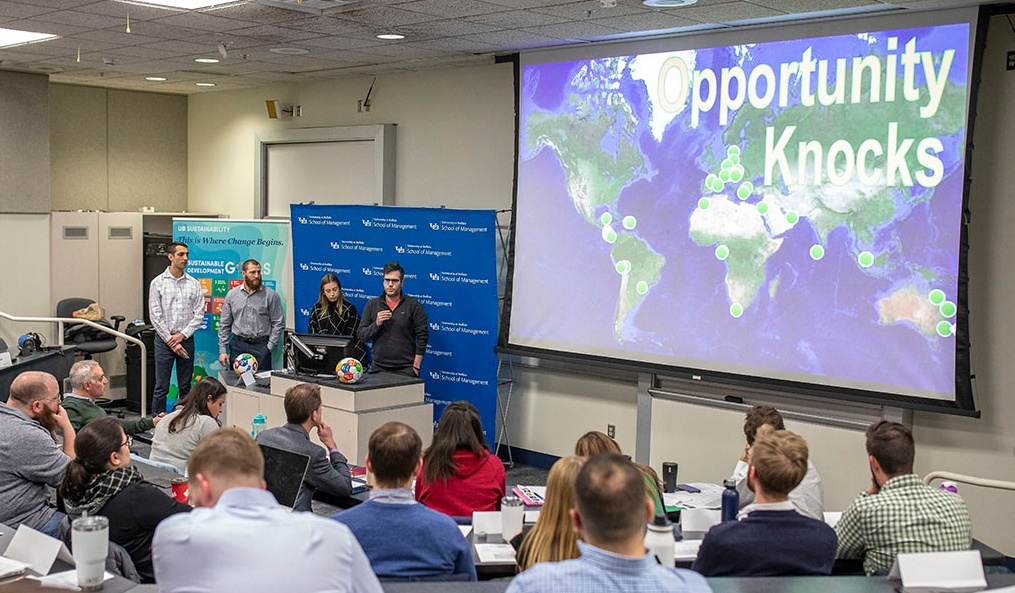
In this MBA course, students get a hands-on look at why sustainability makes smart business sense. Working in teams, students develop an idea or company to advance one of the United Nations’ sustainable development goals, and create a concept paper, short video pitch and a longer live pitch to sell their idea to a panel of judges.

Gain the technical and managerial skills needed to solve the world's most pressing transportation and logistics questions. In collaboration with the UB School of Engineering and Applied Sciences, we offer a Master of Science in Sustainable Transportation and Logistics that gives graduates the tools and knowledge to excel in a competitive global marketplace. Emphasizing environmentally friendly and socially responsible technologies and practices, the program integrates analytical and engineering problem-solving skills with management principles to prepare graduates for a variety of rewarding careers.

To reduce their carbon footprint, organizations must examine their entire operations and supply chain—from how they acquire, warehouse and transport materials, to how they manufacture products, to how customers use and eventually discard those goods. In the Sustainable Operations course, students learn how firms can ensure both profitability and social responsibility, including such concepts as life cycle assessment, carbon footprinting, recycling and remanufacturing, energy efficiency, and eco-certifications.

As part of UB’s Advanced Certificate in Sustainability and the MA in Sustainability Leadership program, the School of Management offers a graduate-level elective, titled Business Management Implications of Sustainable Development.
Partners in Progress
The School of Management works collaboratively within the UB and Western New York communities, and with organizations around the world, to help develop sustainable solutions to today’s many challenges.
Our partners include:
Speakers and Conferences
To spark conversation and inspire innovation, we bring thought leaders from around the world to campus for various conferences and events.

